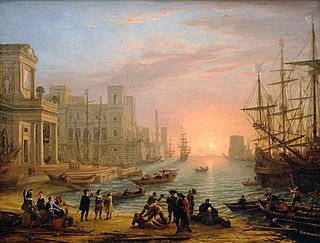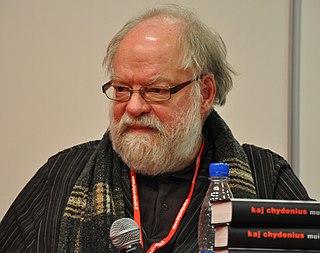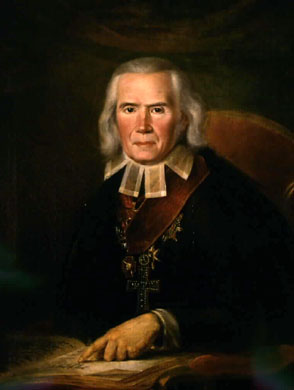
The balance of trade, commercial balance, or net exports, is the difference between the monetary value of a nation's exports and imports over a certain time period. Sometimes a distinction is made between a balance of trade for goods versus one for services. The balance of trade measures a flow of exports and imports over a given period of time. The notion of the balance of trade does not mean that exports and imports are "in balance" with each other.

Mercantilism is a nationalist economic policy that is designed to maximize the exports and minimize the imports for an economy. In other words, it seeks to maximize the accumulation of resources within the country and use those resources for one-sided trade. It promotes imperialism, colonialism, protectionism, currency manipulation, and tariffs and subsidies on traded goods to achieve that goal.
A tariff is a tax imposed by the government of a country or by a supranational union on imports or exports of goods. Besides being a source of revenue for the government, import duties can also be a form of regulation of foreign trade and policy that taxes foreign products to encourage or safeguard domestic industry. Protective tariffs are among the most widely used instruments of protectionism, along with import quotas and export quotas and other non-tariff barriers to trade.

Free trade is a trade policy that does not restrict imports or exports. In government, free trade is predominantly advocated by political parties that hold economically liberal positions, while economic nationalist and left-wing political parties generally support protectionism, the opposite of free trade.

Kokkola is a town and municipality of Finland. The town is located in the Central Ostrobothnia region. The town has a population of 48,027 and covers an area of 2,730.80 square kilometres (1,054.37 sq mi) of which 1,286.61 km2 (496.76 sq mi) is water. The population density is 33.26 inhabitants per square kilometre (86.1/sq mi). Neighbour municipalities are Halsua, Kalajoki, Kannus, Kaustinen, Kronoby, Lestijärvi, Larsmo and Toholampi.

Protectionism, sometimes referred to as trade protectionism, is the economic policy of restricting imports from other countries through methods such as tariffs on imported goods, import quotas, and a variety of other government regulations. Proponents argue that protectionist policies shield the producers, businesses, and workers of the import-competing sector in the country from foreign competitors. Opponents argue that protectionist policies reduce trade and adversely affect consumers in general as well as the producers and workers in export sectors, both in the country implementing protectionist policies and in the countries protected against.
The invisible hand is a metaphor used by the Scottish moral philosopher Adam Smith that describes the inducement a merchant has to keep his capital at home, thereby increasing the domestic capital stock and enhancing military power, both of which are in the public interest and neither of which he intended. Some later authors have broadened this to imply the unintended greater social impacts brought about by individuals acting in their own self-interests. Smith originally mentioned the term in his work Theory of Moral Sentiments in 1759, but it has actually become known from his main work The Wealth of Nations, where the phrase is mentioned only once, in connection with import restrictions.

Anders Chydenius was a Swedish-Finnish Lutheran priest and a member of the Swedish Riksdag, and is known as the leading classical liberal of Nordic history.
This article gives an overview of liberalism and centrism in Finland. It is limited to liberal and centrist parties with substantial support, mainly proved by having had a representation in parliament. The sign ⇒ means a reference to another party in that scheme. For inclusion in this scheme it is not necessary so that parties labeled themselves as a liberal party.
This article gives an overview of liberalism and centrism in Sweden. It is limited to liberal and centrist parties with substantial support, mainly proved by having had a representation in parliament. The sign ⇒ denotes another party in that scheme. For inclusion in this article it isn't necessary for parties to have labelled themselves as a liberal party.

Kaj Oskar Chydenius is a Finnish composer, probably best known for his left-wing political songs interpreted by various artists.

Out of Bounds is the sixth album by Finnish a cappella ensemble Rajaton, released in 2006. Like their 2001 album Boundless, this album is almost entirely in English and was originally intended to be export only in order to reach out to foreign listeners. The CD contains two re-releases, four new versions of previously recorded songs, English versions of three Kevät songs and three new tracks.
In the history of economic thought, a school of economic thought is a group of economic thinkers who share or shared a common perspective on the way economies work. While economists do not always fit into particular schools, particularly in modern times, classifying economists into schools of thought is common. Economic thought may be roughly divided into three phases: premodern, early modern and modern. Systematic economic theory has been developed mainly since the beginning of what is termed the modern era.

Jacob Tengström was a Finnish prelate who became the first Archbishop of Turku and Finland.

The economy of Sweden is a highly developed export-oriented economy, aided by timber, hydropower, and iron ore. These constitute the resource base of an economy oriented toward foreign trade. The main industries include motor vehicles, telecommunications, pharmaceuticals, industrial machines, precision equipment, chemical goods, home goods and appliances, forestry, iron, and steel. Traditionally, Sweden relied on a modern agricultural economy that employed over half the domestic workforce. Today Sweden further develops engineering, mine, steel, and pulp industries, which are competitive internationally, as evidenced by companies like Ericsson, ASEA/ABB, SKF, Alfa Laval, AGA, and Dyno Nobel.
The Tolerance Act was a Swedish law, enacted by Gustav III of Sweden 24 January 1781. It guaranteed freedom of religion and full citizen rights for all Christian immigrants and foreign residents in Sweden.

Events from the year 1803 in Sweden

The economic history of Sweden's Age of Liberty examine the changes to the Swedish economy between 1718 and 1772. The economic factors that contributed to the fall of the Swedish Empire and the shift away from absolutism, as well as the legacy of the era in terms of the nation's economic history after 1772 are also noted.
The FreedomofthePressAct is one of four Fundamental Laws of the Realm and thus forms part of the Swedish Constitution. The Act regulates matters regarding freedom of press and principle of public access to official records. The Freedom of the Press Act as well as the Fundamental Law on Freedom of Expression is one of the two "basic media acts" in Sweden. The Freedom of the Press Act is derived from the Freedom of the Press Act of 1766; the legislation is regarded as the world's first law supporting the freedom of the press and freedom of information.












